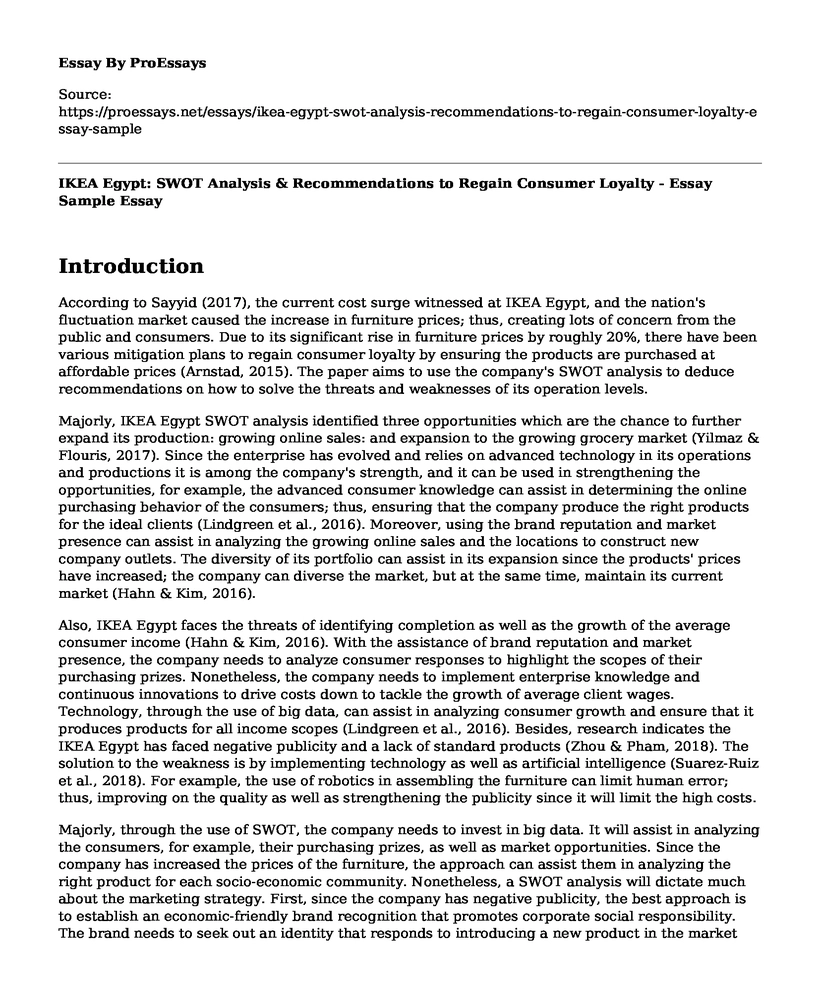Introduction
According to Sayyid (2017), the current cost surge witnessed at IKEA Egypt, and the nation's fluctuation market caused the increase in furniture prices; thus, creating lots of concern from the public and consumers. Due to its significant rise in furniture prices by roughly 20%, there have been various mitigation plans to regain consumer loyalty by ensuring the products are purchased at affordable prices (Arnstad, 2015). The paper aims to use the company's SWOT analysis to deduce recommendations on how to solve the threats and weaknesses of its operation levels.
Majorly, IKEA Egypt SWOT analysis identified three opportunities which are the chance to further expand its production: growing online sales: and expansion to the growing grocery market (Yilmaz & Flouris, 2017). Since the enterprise has evolved and relies on advanced technology in its operations and productions it is among the company's strength, and it can be used in strengthening the opportunities, for example, the advanced consumer knowledge can assist in determining the online purchasing behavior of the consumers; thus, ensuring that the company produce the right products for the ideal clients (Lindgreen et al., 2016). Moreover, using the brand reputation and market presence can assist in analyzing the growing online sales and the locations to construct new company outlets. The diversity of its portfolio can assist in its expansion since the products' prices have increased; the company can diverse the market, but at the same time, maintain its current market (Hahn & Kim, 2016).
Also, IKEA Egypt faces the threats of identifying completion as well as the growth of the average consumer income (Hahn & Kim, 2016). With the assistance of brand reputation and market presence, the company needs to analyze consumer responses to highlight the scopes of their purchasing prizes. Nonetheless, the company needs to implement enterprise knowledge and continuous innovations to drive costs down to tackle the growth of average client wages. Technology, through the use of big data, can assist in analyzing consumer growth and ensure that it produces products for all income scopes (Lindgreen et al., 2016). Besides, research indicates the IKEA Egypt has faced negative publicity and a lack of standard products (Zhou & Pham, 2018). The solution to the weakness is by implementing technology as well as artificial intelligence (Suarez-Ruiz et al., 2018). For example, the use of robotics in assembling the furniture can limit human error; thus, improving on the quality as well as strengthening the publicity since it will limit the high costs.
Majorly, through the use of SWOT, the company needs to invest in big data. It will assist in analyzing the consumers, for example, their purchasing prizes, as well as market opportunities. Since the company has increased the prices of the furniture, the approach can assist them in analyzing the right product for each socio-economic community. Nonetheless, a SWOT analysis will dictate much about the marketing strategy. First, since the company has negative publicity, the best approach is to establish an economic-friendly brand recognition that promotes corporate social responsibility. The brand needs to seek out an identity that responds to introducing a new product in the market that can be purchased by every consumer regardless of their financial status. For example, the establishment needs to submit different premiums on buying the products.
References
Arnstad, H. (2015). Ikea fascism: Metapedia and the internationalization of Swedish generic fascism. Fascism, 4(2), 194-208.
Hahn, Y., & Kim, D. (2016). Corporate Social Responsibility: A Comparison Analysis. The East Asian Journal of Business Management (EAJBM), 6(4), 13-17.
Lindgreen, A., Maon, F., & Vallaster, C. (2016). Building brands via corporate socialresponsibility. The Routledge companion to contemporary brand management, 228-254.
Sayyadi, A. (2017). Developing a tool to assess the integration of sustainability into banks: A case study on a bank in Egypt.
Suarez-Ruiz, F., Zhou, X., & Pham, Q. C. (2018). Can robots assemble an IKEA chair?. Science Robotics, 3(17), eaat6385.
Yilmaz, A. K., & Flouris, T. (2017). Enterprise risk management in terms of organizational culture and leadership and strategic management. Corporate risk management forinternational business (pp. 65-112). Springer, Singapore.
Zhou, X., & Pham, Q. C. (2018). Can robots assemble an IKEA chair?. Science Robotics, 3(17).
Cite this page
IKEA Egypt: SWOT Analysis & Recommendations to Regain Consumer Loyalty - Essay Sample. (2023, Mar 01). Retrieved from https://proessays.net/essays/ikea-egypt-swot-analysis-recommendations-to-regain-consumer-loyalty-essay-sample
If you are the original author of this essay and no longer wish to have it published on the ProEssays website, please click below to request its removal:
- Core Competencies and Capabilities of GE Company
- World Without Mind by Franklin Foer Essay Example
- Sources of Innovative Opportunities Essay
- Different Ways for Inducing Ongoing Improvements in Small Size Company
- Essay Sample on Electric Cars: From Innovation to Substitution
- Annotated Bibliography Sample on Mobile Phones and Social Interaction: A Comparative Study of University Students
- Report Sample on Difference Between Product & Project







